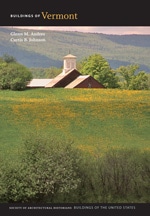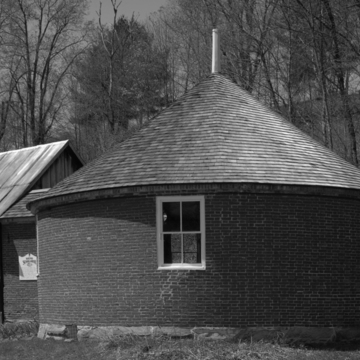You are here
Town Hall (Round Schoolhouse)
This unusual round, brick schoolhouse is a testament to the importance of public education when the Connecticut River piedmont of Windham County reached full agricultural settlement between 1820 and 1830. In August 1821, the town purchased a small lot on the main brook road for five dollars, intending to build a replacement for a log schoolhouse nearby. Two members of a building commit tee, Dr. William Perry and Samuel Stebbins, approved a plan by Dr. John Wilson, the immigrant son of a blacksmith from Muirkirk, Scotland. Wilson had been a highwayman in Scotland before escaping to the United States in 1819, but when he settled in Brookline he became a schoolteacher. Wilson's scheme produced a substantial Flemish bond schoolhouse with a conical wood-shingle roof. A small brick porch leads to the main entrance, and the interior is a single room, originally with sixty desks and a central chimney. In 1910 the present floor, two-over-two sash windows, and a woodshed ell were added. In 1929, the school closed and the town hall took over the building, continuing to occupy it today.
Writing Credits
If SAH Archipedia has been useful to you, please consider supporting it.
SAH Archipedia tells the story of the United States through its buildings, landscapes, and cities. This freely available resource empowers the public with authoritative knowledge that deepens their understanding and appreciation of the built environment. But the Society of Architectural Historians, which created SAH Archipedia with University of Virginia Press, needs your support to maintain the high-caliber research, writing, photography, cartography, editing, design, and programming that make SAH Archipedia a trusted online resource available to all who value the history of place, heritage tourism, and learning.






